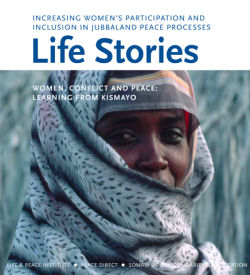Publications & reports
Life Stories: Learning from Kismayo
Women, Conflict and Peace
‘Life Stories’ is a set of deep, introspective narratives provided by six of the individual women that took part in a research process that examined the gendered dynamics of inter-clan conflict in Kismayo, Somalia, and in particular the role of women in processes of violence and peace. The ‘Life Stories’ provide a complementary human grounding to the connected research report, titled 'Increasing Women’s Participation and Inclusion in Jubbaland Peace Processes: Learning from Kismayo'.

- Date
- Type
- Report
- Country/Region
- Somalia
The publication come from the Life & Peace Institute, in partnership with Peace Direct and the Somali Women Solidarity Organization, with the support of the Swedish International Development Agency and the European Union.
The report accompanied the study report 'Increasing Women’s Participation and Inclusion in Jubbaland Peace Processes: Learning from Kismayo' - an examination of the gendered dynamics of inter-clan conflict in Kismayo, Somalia.
Summary
There is no one who God created who has helped us. Even after they killed my mother, the problem did not leave us—until we moved away. The attacks at night carried on.
Basra was around six years old, living with her mother and maternal relatives in a rural village in Middle Jubba when her life was affected by the clan wars that had erupted and split the Somali population after state collapse in 1991. She vividly remembers the dreadful impact of the violence that became an everyday reality. Her account sees the war through the eyes of a girl-child. Although she was not wounded or killed, as would have happened had she been a boy-child, she is made motherless. Both mother and daughter become victims of the clannism driving the violence – clannism that continues to affect Basra’s life, and over which she has no control.
For Basra, the worst violence comes from the hands of those closest to her – her paternal family members and later her in-laws. Her life’s shocking twists and turns illuminate the toxic and ideological nature of clannism. Clannism can be wherever there are people prepared to buy into it: between husband and wife, the wider family, the market, the school, the neighbourhood. Basra’s narrative illustrates the power of patriarchy and the readiness of some women to harm other women and girls to secure their own interests. Her life story also demonstrates how much easier this abuse is made when the victim is not from one’s own clan and lacks male protection. Harrowing to read at times, by the end of her story, it is apparent that Basra embodies remarkable resilience. LPI’s researcher recalls that this was an emotional interview. She met Basra early in the morning, before the focus group discussion that day had begun. When they met, Basra was at ease and spoke openly and at length, happy to share her story. They sat outside, just the two of them, as no one else was awake. Basra needed little prompting.